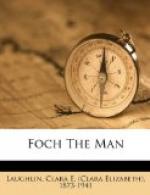In the five years, 1895-1901 (his work at the school was interrupted by politics in 1901), “many hundreds of officers,” as Rene Puaux says, “the very elite of the general staffs of our army, followed his teaching and were imbued with it; and as they practically all, at the beginning of the war, occupied high positions of command, one may estimate as he can the profound and far reaching influence of this one grand spirit.”
Let us try to get some idea of the sort of thing that Foch taught those hundreds of French army officers, not only about war but about life.
From all his study, he repeatedly declared, one dominant conviction has evolved: Force that is not dominated by spirit is vain force.
Victory, in his belief, goes to those who merit it by the greatest strength of will and intelligence.
It was his endeavor, always, to develop in the hundreds of officers who were his students, that dual strength in which it seemed to him that victory could only lie: moral and intellectual ability to perceive what ought to be done, and intellectual and moral ability to do it.
In his mind, it is impossible to be intelligent with the brain alone. The Germans do not comprehend this, and therein, to Ferdinand Foch, lies the key to all their failures.
He believes that each of us must think with our soul’s aid—that is to say, with our imagination, our emotions, our aspiration—and employ our intelligence to direct our feeling.
And he asks this combination not from higher officers alone, but from all their men down to the humblest in the ranks.
He believes in the invincibility of men fighting for a principle dearer to them than life—but he knows that ardor without leadership means a lost cause; that men must know how to fight for their ideals, their principles; but that their officers are charged with the sacred responsibility of making the men’s ardor and valor count.
At the beginning of his celebrated course of lectures on tactics he always admonished his students thus:
“You will be called on later to be the brain of an army. So I say to you to-day: Learn to think.”
By this he was far from meaning that officers were to confine thinking to themselves, but that they were to teach themselves to think so that they might the better hand on intelligence and stimulate their men to obey not blindly but comprehendingly.
It was a maxim of Napoleon’s, of which Foch is very fond, that “as a general rule, the commander-in-chief ought only to indicate the direction, determine the ends to be attained; the means of getting there ought to be left to the free choice of the mediums of execution, without whom success is impossible.”
This leaves a great responsibility to officers, but it is the secret of that flexibility which makes the French army so effective.
For Foch carries his belief in individual judgment far beyond the officers commanding units; he carries it to the privates in the ranks.




